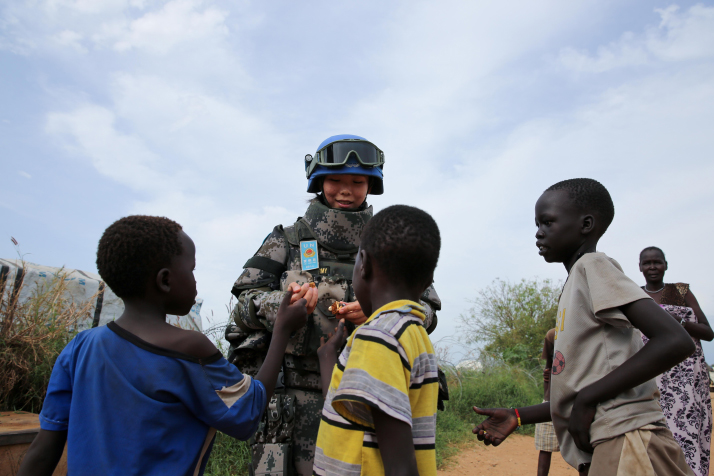|
||||||||||
| Home Nation World Business Opinion Lifestyle ChinAfrica Multimedia Columnists Documents Special Reports |
|
||||||||||
| Home Nation World Business Opinion Lifestyle ChinAfrica Multimedia Columnists Documents Special Reports |
| ChinAfrica |
| Eye on Development |
| Development is key to solving refugee problems |
| By He Wenping | VOL.11 March ·2019-03-05 |

Under the theme of Refugees, Returnees and Internally Displaced Persons: Toward Durable Solutions to Forced Displacement in Africa, the 32nd Ordinary Summit of the African Union (AU) was held in late January and early February. It is true that the refugee problem has caught the attention of the international community as the number of refugees worldwide has reached a record high, leading to the most serious refugee crisis in Europe after World War II. The Middle East and Africa are two big sources of refugees.
According to Global Trends: Forced Displacement in 2017, released by the UN Refugee Agency in June 2018, the global population of forcibly displaced people increased to 68.5 million by the end of 2017, which means one out of every 110 people in the world is displaced.
Wars and conflicts are the root causes leading to the refugee problem in Africa. Africa is the continent most vulnerable to regional chaos and military conflicts. On the whole, Africa remains peaceful and stable since the end of the Cold War in the early 1990s. Despite this, there are still, however, nearly 10 African countries facing wars, military coups, or internal military conflicts of various extents. Frequent unrests have hindered economic development in Africa and weakened the efforts of strengthening African unity and national reconciliation, leading to a series of political and social problems such as a refugee crisis, weapon smuggling and drug trafficking.
Poverty and underdeveloped economies are another root cause of the refugee problem. Africa is the world's second largest continent in terms of size and population. The continent is concentrated with the largest number of least developed countries. Though the continent has seen restorative growth in its economy in the past two decades, it is still the most impoverished continent owing to its backward infrastructure and late development.
In addition, high rates of HIV/AIDS infections and other diseases, low literacy levels, heavy dependence on single-product economies and frequent occurrence of famines and natural disasters are also the reasons leading to refugees and displaced persons.
Peace and development needed
In the short term, the international community needs to help refugees and internally displaced persons when famines or conflicts take place through providing accommodation, food and medical services. The host countries also need to finance the establishment of settlements, rescue stations and shelters for the refugees.
In the long term, the sustainable solution to the refugee problem is addressing the root causes, namely through maintaining stability and promoting economic development. Though Africa, as a whole, remains stable in terms of politics and security, some regions face arduous security situations, which may become new sources of increasing numbers of refugees.
Security problems in Africa should be addressed through the joint efforts of related countries, regional organizations, the AU and the international community.
Take South Sudan, the world's third largest refugee source, for example. After the civil war took place in the country in 2013, the surrounding countries like Ethiopia, regional organization IGAD (Intergovernmental Authority on Development), and countries such as China and the United States actively participated in intermediation and negotiations for reconciliation.
The AU's role in addressing the refugee problem on the continent should also be further strengthened. Though the continental organization has made unremitting efforts in building Africa's security structure to deal with crisis and challenges, the AU's efforts in solving African problems with African solutions often face frustrations, owing to the strong interventions from the Western powers and the lack of resources and capacity. To some extent, trends show that the AU is marginalized.
In this context, maintaining hard-earned peace and stability in Africa and improving the AU's capacity of independently solving African problems are the important political and security premises to address the refugee problem and promote African unity and rejuvenation.
Economic development is equally important. Since the 1990s, African economies have shown a trend of steady growth with an annual economic growth rate of nearly 6 percent. According to statistics from the International Monetary Fund, the African economy grew strongly in 2018, reaching 3.4 percent. The per-capita GDP in African countries reached $1,990 on average, a bit lower than India's $2,020.
However, behind the encouraging figures, poverty and inequality, weak economies, single-product economies and regional chaos are still apparent. In reality, people feel the expansion of the gap between the rich and the poor and the impressive economic data counts for very little.
Owing to terrorist organizations like Boko Haram, the humanitarian crisis in northeast Nigeria and around Lake Chad has entered its 10th year. The new round of violence by Boko Haram has resulted in tens of thousands of displaced people. The United Nations estimates that there are about 2.5 million displaced persons around the Lake Chad region, including 1.8 million in Nigeria. On January 29, the United Nations launched the 2019-21 Humanitarian Response Strategy and the Regional Refugee Response Plan, respectively, seeking $848 million and $135 million to continue providing food, water, shelter and protection to the most vulnerable people in Nigeria and neighboring Cameroon, Chad and Niger.
Chinese assistance
The 40-year rapid development after China's reform and opening up in the late 1978 has seen China grow from a closed and impoverished country into the world's second largest economy with per-capita GDP growing from less than $200 to more than $8,600. In this time the Chinese Government prioritized development as the key to promote reforms in various fields, following the concept of "using development to solve the problems in the process of development."
For developing countries such as China and African countries, development is fundamental and the basis to solving all problems.
China not only offers generous support in helping African refugees by providing funds and materials for settlement, but also actively provides Chinese solutions in helping African countries alleviate poverty and promote development, which are the root causes of the refugee problem. For instance, when Somali and other Horn of Africa countries suffered drought disaster and large-scale famine in summer of 2011, the Chinese Government immediately provided emergency assistance in grain and cash, worth 443.2 million yuan ($68.2 million). In March 2014 when the Ebola epidemic broke out in West African countries such as Guinea, Liberia and Sierra Leone, China provided assistance materials and funds totaling 750 million yuan ($122 million).
To promote sustainable economic development in Africa, the Chinese Government has been rolling out a package of development, assistance and cooperation plans to strengthen China-Africa economic cooperation and promote infrastructure construction and industrialization in Africa every three years since 2000, when the Forum on China-Africa Cooperation (FOCAC) was established. This has made a great contribution to the economic recovery in Africa in the past two decades. For instance, in December 2015 and September 2018, the FOCAC Summit was held, respectively, in Johannesburg, South Africa, and Beijing, China. Against the backdrop of the rise of trade protectionism worldwide, the Chinese Government pledged 10 China-Africa cooperation plans and eight major initiatives during these summits, both supported by a $60-billion financial package, helping Africa fight poverty and address refugee problem.
(Comments to niyanshuo@chinafrica.cn)

(The author is a senior researcher of the Charhar Institute and a researcher of Institute of West-Asian and African Studies, Chinese Academy of Social Sciences)
| About Us | Contact Us | Advertise with Us | Subscribe |
| Copyright Beijing Review All rights reserved 京ICP备08005356号-5 京公网安备110102005860号 |